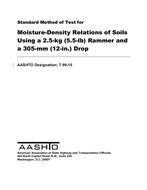Click here to purchase
These methods of test are intended for determining the relation between the moisture content and density of soils compacted in a mold of a given size with a 2.5-kg (5.5-lb) rammer dropped from a height of 305 mm (12 in.). Four alternate procedures are provided as follows:
- Method A–A 101.60-mm (4-in.) mold: Soil material passing a 4.75-mm (No. 4) sieve.
- Method B–A 152.40-mm (6-in.) mold: Soil material passing a 4.75-mm (No. 4) sieve.
- Method C–A 101.60-mm (4-in.) mold: Soil material passing a 19.0-mm (3/4-in.) sieve.
- Method D–A 152.40-mm (6-in.) mold: Soil material passing a 19.0-mm (3/4-in.) sieve.
This test method applies to soils mixtures that have 40 percent or less retained on the 4.75 mm- (No. 4) sieve, when Method A or B is used and 30 percent or less retained on the 19.0-mm (¾-in.) sieve, when Method C or D is used. The material retained on these sieves shall be defined as oversize particles (coarse particles).
If the test specimen contains oversized particles, dry density and moisture corrections must bemade in accordance with Annex A1..
If the specified oversized maximum tolerances are exceeded, other methods of compaction control must be used.
Note – One method for the desin and control of the compaction of such soils is to use a test fill to determine the required degree of compaction and a method to obtain that compaction. Then use a method specification to control the compaction by specifying the type and size of compaction equipment, the lift thickness and the number of passes.
Product Details
- Published:
- 2015
- Number of Pages:
- 14
- File Size:
- 1 file , 1.8 MB
